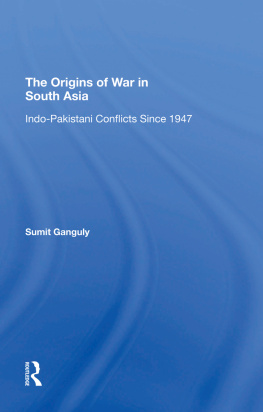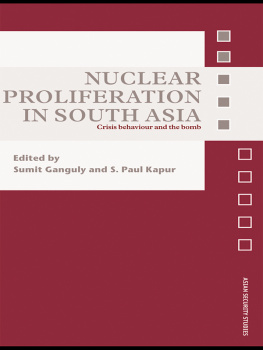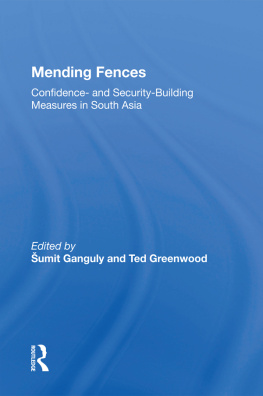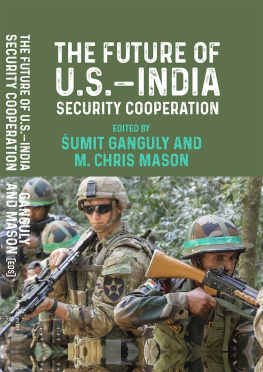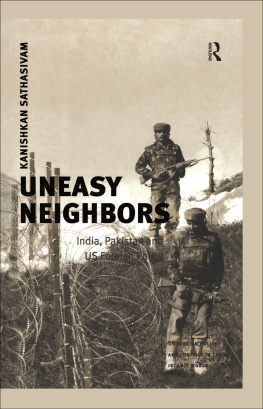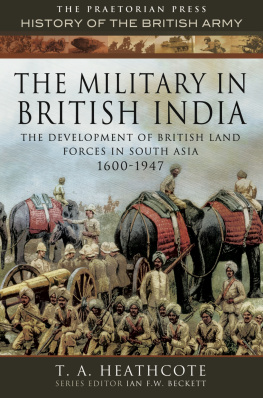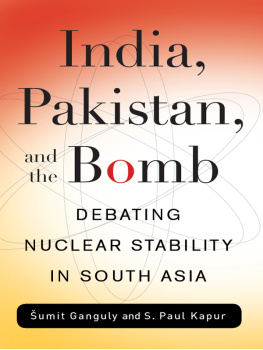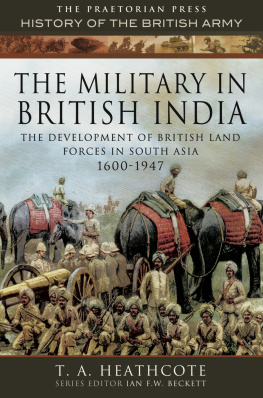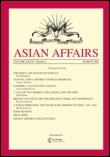The Origins of War in South Asia
About the Book and Author
In examining the forces that made the Indo-Pakistani relationship prone to conflict, Dr. Ganguly focusses first on the nature of the British colonial disengagement policy, a hasty and ill-conceived procedure that served to exacerbate the ideological differences between India's major political parties, the Congress and the Muslim League. Their competing viewsthe Congress espoused a secular polity while the League drew its inspiration from Islamic tenetsformed the basis of the two polities that emerged from the collapse of the British Indian empire.
Disputes also arose over the uncertain status of Kashmir. With the lapse of the British doctrine of paramountcy (recognition of the British as the sovereign power in India), the so-called princely states had to join either India or Pakistan on the basis of geographic location and demographic composition. Kashmir posed a problem because of its location and because it had a Hindu monarch ruling a Muslim majority population. This peculiar status made it the center of a Pakistani irredentist claim. This claim was rejected by India, iintent upon demonstrating that all minorities could thrive under the aegis of secular government.
Once set in motion by the interplay of domestic, regional, and systematic factors, these three forces--disengagement, ideological differences, and the conflict over Kashmir--brought the subcontinent to war in 1947-1948, 1965, and 1971. Dr. Ganguly provides a comprehensive and comparative analysis of these three Indo-Pakistani conflicts as well as an assessment of both the impact of the Soviet invasion of Afghanistan on the security of South Asia and the changes in the perceptions of that security.
Sumit Ganguly is assistant professor of political science at Hunter College.
The Origins of War in South Asia
Indo-Pakistani Conflicts Since 1947
Sumit Ganguly
First published 1986 by Westview Press
Published 2019 by Routledge
52 Vanderbilt Avenue, New York, NY 10017
2 Park Square, Milton Park, Abingdon, Oxon OX14 4RN
Routledge is an imprint of the Taylor & Francis Group, an informa business
Copyright 1986 by Taylor & Francis
All rights reserved. No part of this book may be reprinted or reproduced or utilised in any form or by any electronic, mechanical, or other means, now known or hereafter invented, including photocopying and recording, or in any information storage or retrieval system, without permission in writing from the publishers.
Notice:
Product or corporate names may be trademarks or registered trademarks, and are used only for identification and explanation without intent to infringe.
Library of Congress Cataloging-in-Publication Data
Ganguly, Sumit.
The origins of war in South Asia
(Westview special studies on South and Southeast Asia)
1. India-Pakistan Conflict, 1947-1949. 2. India
Pakistan Conflict, 1965. 3. India-Pakistan Conflict,
1971. I. Title. II. Series.
DS385.9.G36 1986 954.04 86-4082
ISBN 13: 978-0-367-29462-5 (hbk)
This book is based on my doctoral dissertation which I wrote while in the Political Science program at the University of Illinois at Urbana/Champaign. My interest in writing a dissertation on security issues in South Asia stemmed from my work on the region under the able and exacting direction of Stephen Cohen, my mentor at the University of Illinois. I consider it a rare privilege to have worked under an individual so knowledgeable about security questions in the region. I shall never be able to repay his continued help and support throughout my entire graduate career at the University of Illinois. In addition to the help and guidance from Stephen Cohen I profited enormously from the intellectual rigor and substantive knowledge of Harold Gould (Department of Anthropology, University of Illinois at Urbana/Champaign), Roger Kanet and Edward Kolodziej (both of the Department of Political Science, University of Illinois at Urbana/Champaign)---the other three members of my dissertation committee. Additionally, I need to acknowledge the support of Peter Bock, (formerly of the Department of Political Science, University of Illinois at Urbana/Champaign) in the early stages of the dissertation.
On completing my doctoral work I was most fortunate in obtaining a Post-Doctoral fellowship in the Ford Foundation sponsored Combined Soviet/East European and International Security Program at Columbia University. While at Columbia, Robert Jervis, Philip Oldenburg, Howard Wriggins and Jack Snyder (all of the Department of Political Science) made a number of critical and helpful suggestions on the manuscript.
In addition to contributions of my various academic advisors I benefited considerably from the advice of two friends Kanti Bajpai (of the University of Illinois at Urbana/Champaign) and Sanjoy Banerjee (of Baruch College of the City University of New York). Finally, a large group of individuals in the defense and foreign policy bureaucracies of India, Pakistan and the United States unstintingly provided me with their knowledge and insights about many issues discussed in this work. Owing to their wishes to remain anonymous I cannot thank them individually. While my debt of gratitude to all the above individuals is substantial, any errors of fact and interpretation are necessarily mine.
This manuscript might not have seen the light of day without the word processing abilities of Sandy Nash and Bonnie Weyburne of James Madison College, Michigan State University. Finally, a word of thanks to Dean Birkenkamp and Sally Furgeson of Westview Press for their editorial and technical assistance.
Sumit Ganguly
Introduction
The purpose of this study is to explain the origins of war in the South Asian region between 1947 and 1971. The study will be limited to an analysis of the three Indo-Pakistani conflicts that had common roots, unlike other conflicts that occurred in the regions during the same period. There are three major reasons for explaining the causes of war in the South Asian region. First, it stems from a specific interest in studying the processes that have led to armed conflict in South Asia. Second, although a number of case studies already exist on each of the three wars (1947-1948, 1965, 1971) between India and Pakistan, none provides a comprehensive explanation and analysis of their origins. Third, the issues of separatism and autonomy are still relevant both for India and Pakistan. As recent events indicate, India continues to be plagued by separatist and autonomist demands ranging from Assam to the Punjab. On a lesser scale, Pakistan is also faced with similar demands in Sind and Baluchisthan.
These three wars in the South Asian subcontinent share some characteristics with other international conflicts that occurred following the collapse of the Eurocentric international system. With the collapse of that system, its colonial appendages in Asia and Africa gradually but steadily entered the international system. The process of colonial disengagement was, for the most part, neither well-planned nor tranquil.
In the great majority of cases, it produced violent conflicts as the long-suppressed internal divisions of language, religion, and ethnicity came to the forefront and existing institutions proved incapable of mediating such conflicts. Such divisions within nations had often been held in check by the colonial powers for the purposes of administrative convenience, but with the departure of the colonial powers, these differences surfaced once again. The postcolonial problems are addressed by Rejai and Enloe:

